A Brief, Partial HISTORY OF FENCE
Including Essays by FENCE Editors
and Selected Articles and Interviews
Introduction by Jason Zuzga
In 2009, FENCE published a two-volume anthology entitled A BEST OF FENCE: THE FIRST NINE YEARS. They are available, Vol. 1 and Vol. 2, through Small Press Distribution.
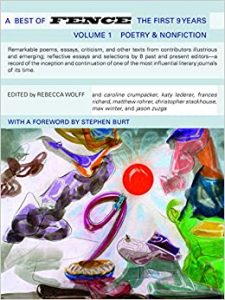
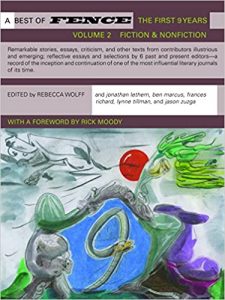
The editors of FENCE up to that point in time contributed essays about their experiences working on the magazine, all of which you can link to below and read, along with the FENCE MANIFESTO OF 1997 which you may read by clicking on it here:
The marketing copy that appears on SPD with each volume reads, approximately, “A historical document so significant it requires two volumes. In addition to each editor selecting for inclusion their favorite pieces published during their tenure, thus presenting an eclectic compendium of poetry, short fiction, criticism, and creative nonfiction, much of it by writers who appeared in Fence at the beginning of careers. These volumes include reflective essays [all of which you can now access below] by editors on their experiences with selected texts, with authors, with the magazine as a collective, and with their own editorial identities, and serves as an indispensable record of the inception and continuation of one of the most influential literary journals of its time. Again, these essays are available immediately following this brief and rather over-simplified introduction.
FENCE's early years were uniquely tumultuous and thrilling. At the time, in 1998, from my point of view, as I moved between what felt like opposing citadels, the poetry world had grown firmly divided into two camps—something not unusual for any of the arts over the course of their histories—with some poets dedicated to building on tradition and narrative, prioritizing accessibility and communion with readers and other poets who wanted to break from tradition, from the comfort of the familiar and provide challenging encounters with and about language for readers. There was much discussion and invective over whose poetry was the correct poetry, the ethically sound poetry, in terms of form and content. FENCE was pivotal in opening a space between what Ron Silliman has called the "Post-Avant" and "The School of Quietude."
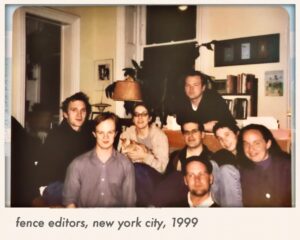
FENCE was initially a kind of salon de refusés—a place—both in the physical journal and in the roving parties and performances—where those who didn't fit into either camp might find a place to gather. A place itself for poetry without a predetermined agenda or dogma, simply open to deep play—in the Winnicottian sense—language of all kinds and modes opportunities for various collaborations and experiences between poet and reader. Contributors were not asked to supply a self-promoting biographical note showing who had the more impressive list of publications, but instead were asked to provide a note about what they were reading and might recommend.
FENCE, through its pages and events, put members of both camps—their combative stances a product of polemic, politics, coterie, both sides believing they were on the side that cared most about readers—into a place where they might actually meet, read one another’s work, converse. After such intercourse, the world of poetry was fundamentally changed. FENCE was both instigator and staging ground. The hybridizations and unexpected influences and encounters have since vastly diminished the hostilities that once were deeply felt depending on which camp one was aligned to. I believe that, with the atmosphere less charged by a need to choose allegiances and demonstrate loyalty, a number of internalized constraints lifted from emerging writers.
Beyond the bridge building, Fence simply threw great parties, from the Anne Carson opera (which you can get a distant taste of with the rusty little clip embedded below), starring folks such as Wallace Shawn, Susan Minot, and I believe (correct me if I'm wrong Mike Nichols)—to the dance party on "The Frying Pan" permanently docked on 12th Ave in NYC on the Hudson River, where as a young innocent editorial assistant I first met former Fence Poetry Editor and current member of the Fence Board of Directors Caroline Crumpacker, as you can read about in more detail in the essay I wrote for A BEST OF FENCE, linked to below, along with all the other editors' essays for the volume. Fence made the city I had moved to. made poetry and literature, something one could thrill to in public as participant and in print.
Here are the cover, Table of Contents, and Editor’s Note of the first issue:
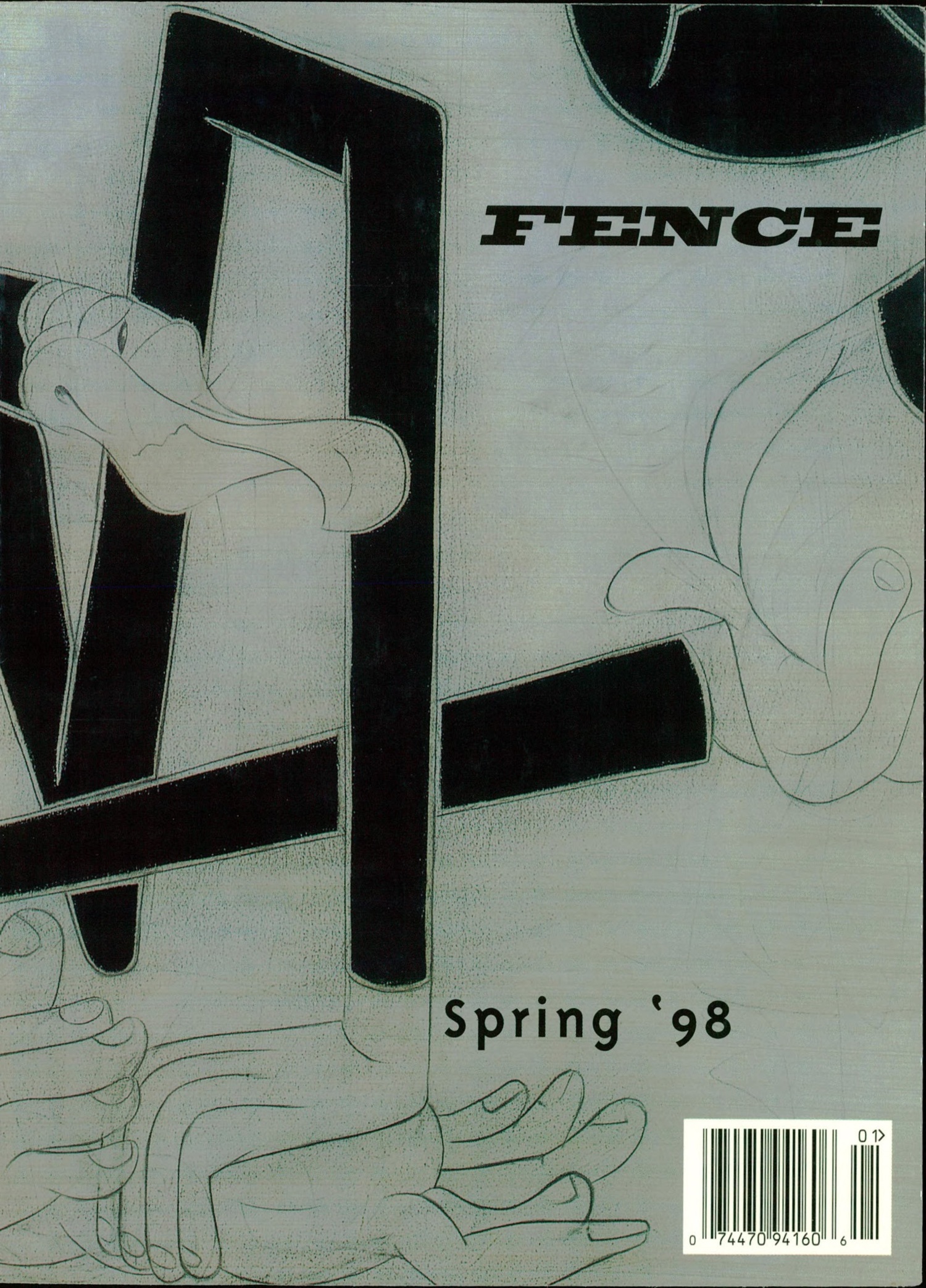
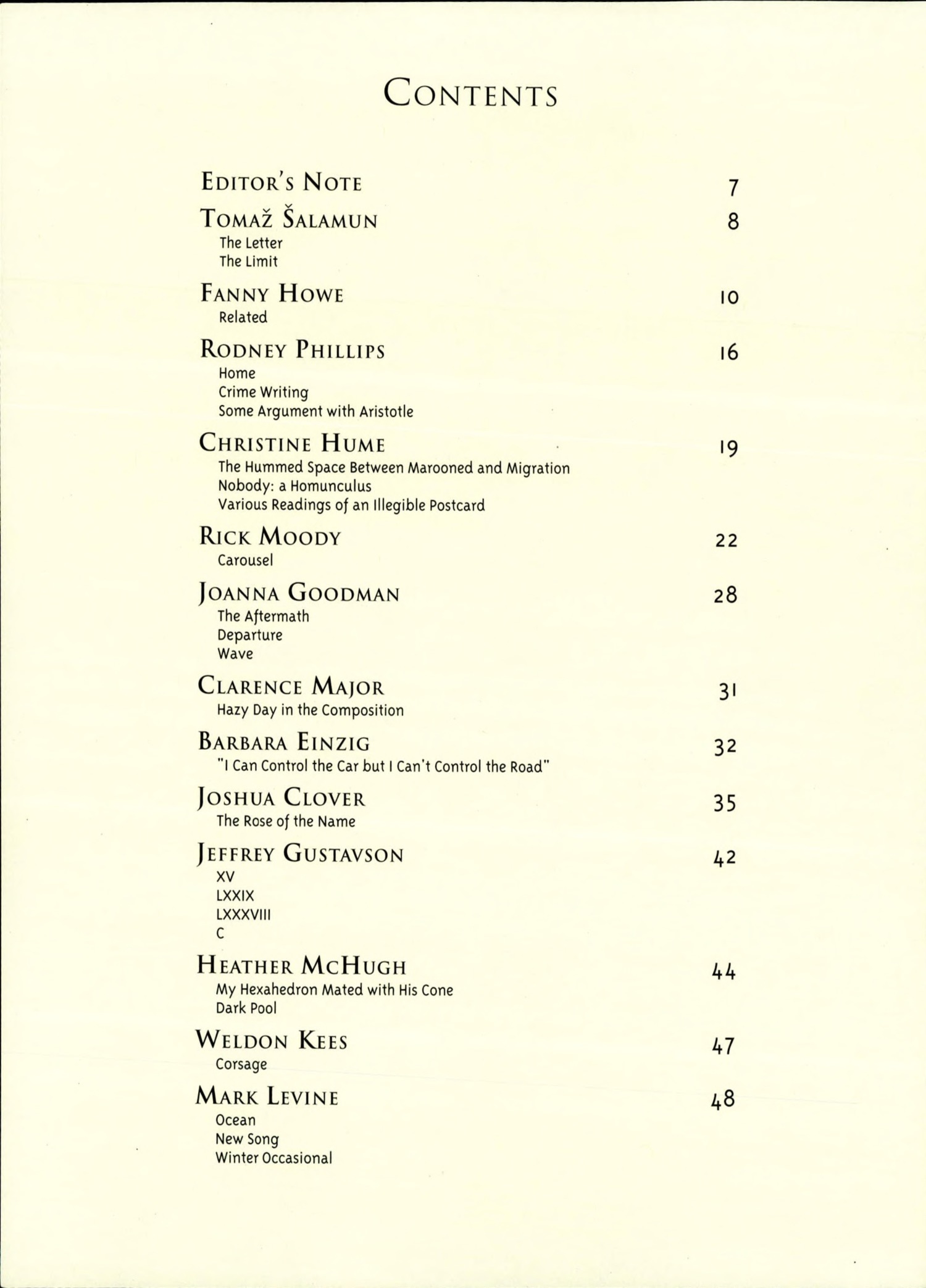
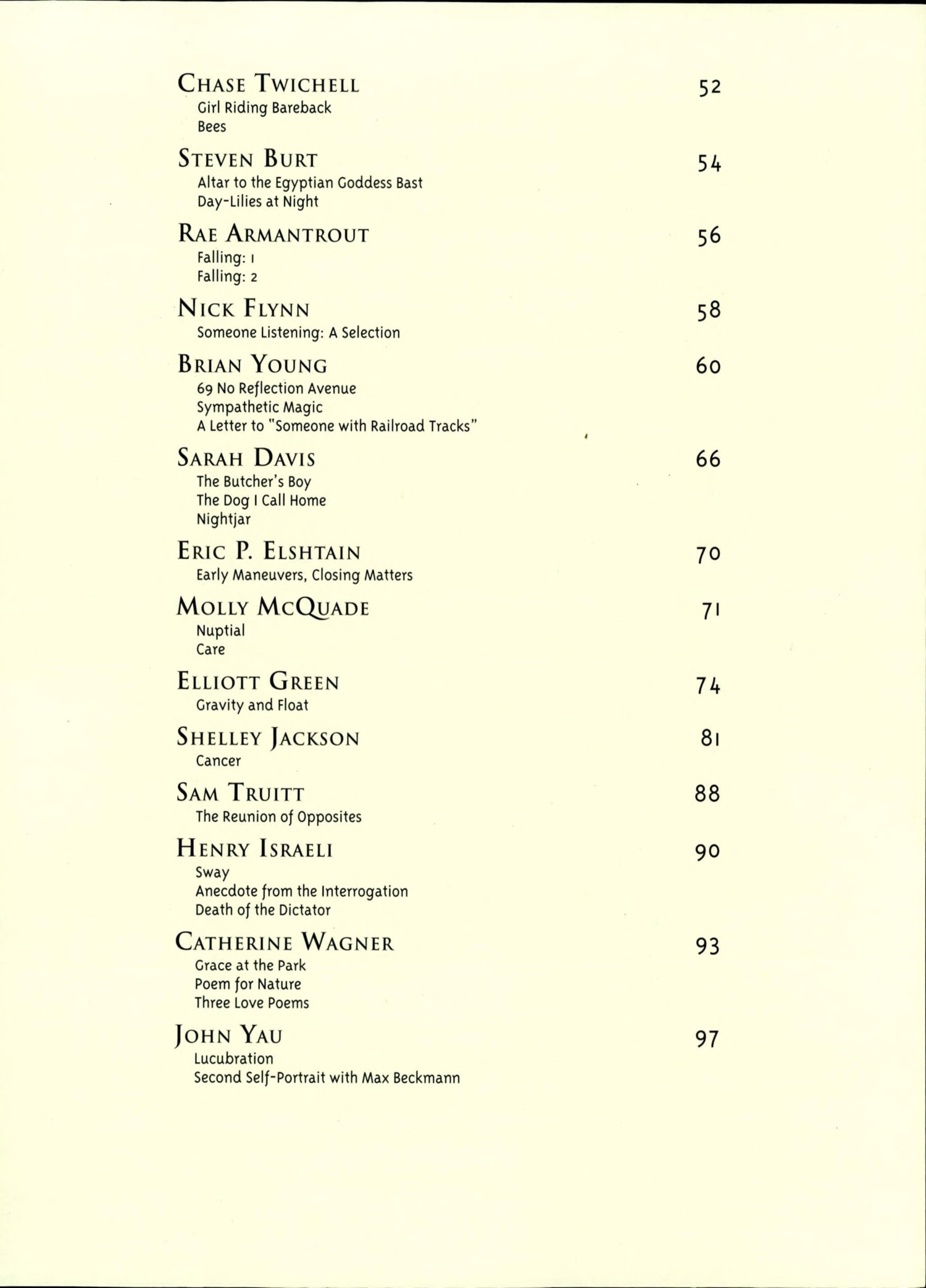
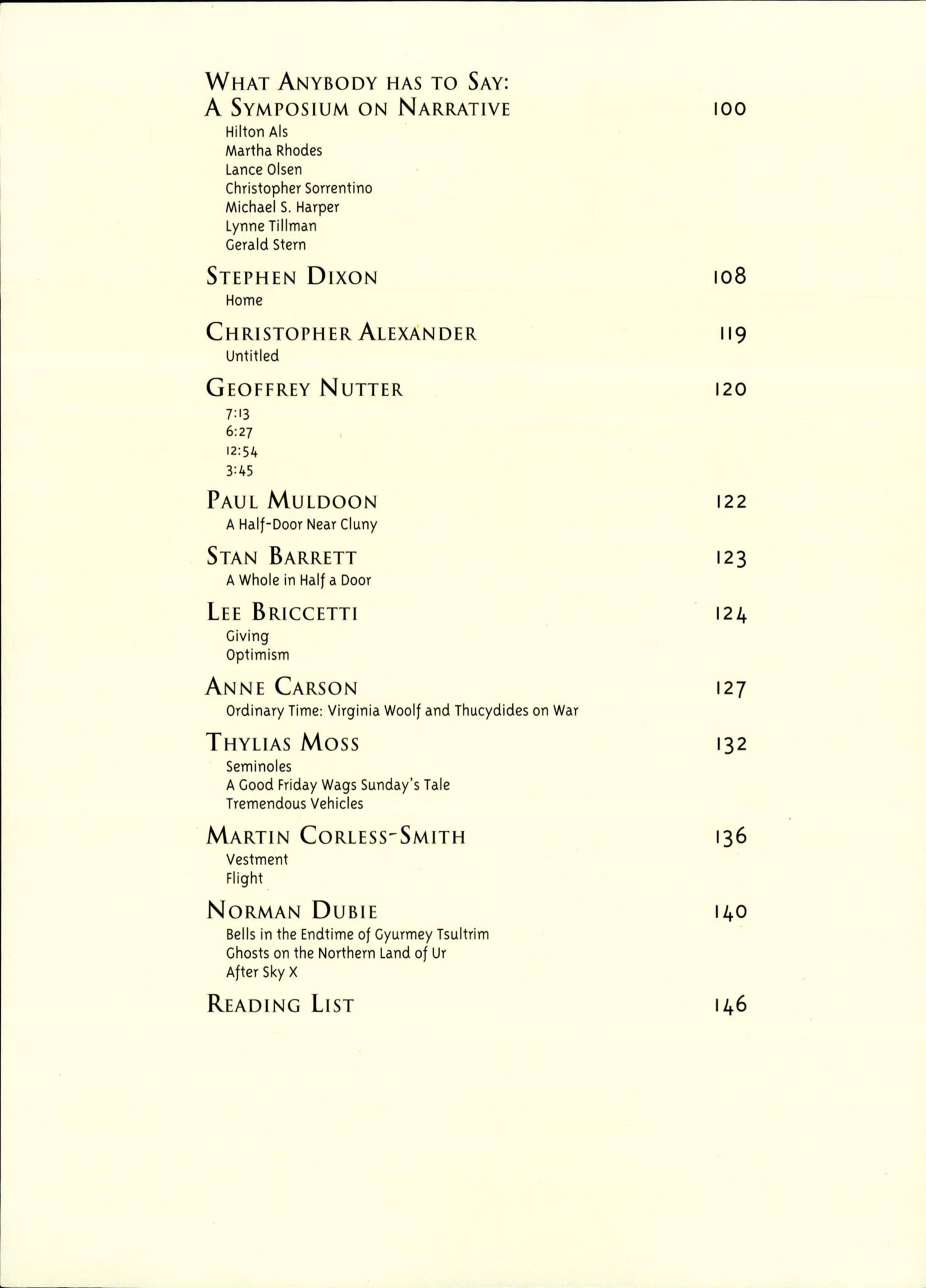
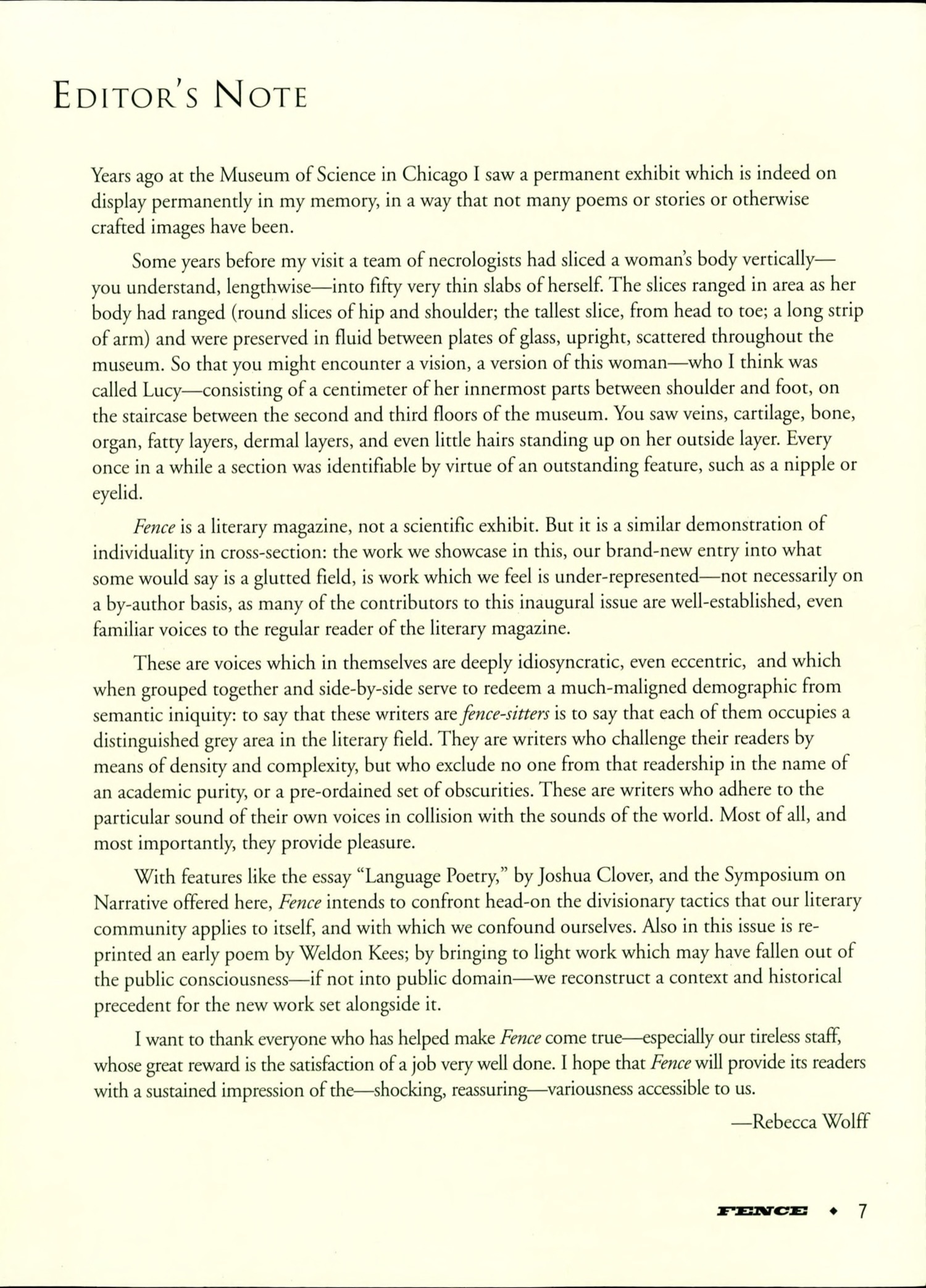
Poetry never stands still. Controversies erupt. Further problems and differences come forward. Amid the elliptical, the playful, the collaged, the conceptual, the pop gesture, the minimal, the expansive, was a movement away from the identity of any speaker of a poem as identical to the poet’s “authentic” subjective speaking self, poems foregrounded any speaking “self” reflexively, ironically, or dismissed it as deceptive artifice. However, such a tendency warps under pressure when confronted with urgent poetry written by poets bearing distinctly socially formed, enforced, and marked identities shaped by racial discrimination, queerness, economic status, or multi-lingual heritage. Take, for example, Cathy Park Hong's indispensable essay "Delusions of Whiteness in the Avant-Garde," published back in 2015 in the journal Lana Turner. An unmarked default "proper" English, as medium for the making of poems or the ground from which poems deviate, can no longer be taken for granted. We must pay close attention to those poets whose use of English resonates with multifarious identity, politics, poetics, ecologies, polylinguality—all language's supple ambiguities and resonances. At the same time, welcoming anything else that tickles the reader's mind in a way that provides challenge and sustenance to any self's available language, ever in flux.
FENCE remains committed to presenting to the public writing from across the genres that we hope will provide readers with textual delight, juicy juxtaposition, and innovative provocation. This began through the biannual print journal, begun in 1998, expanded through the FENCE Books series, which began in 2000. It has further continued to grow through FENCE Digital, live on the internet since 2019, and through FENCE podcast begun in 2020. As it did from its inception—as you will read about in detail in the accounts below—FENCE will work to continue, as much as is possible, to avoid any preconceptions, prescriptions, or limitations on what is best or possible in the literary arts.
In addressing poets considering submitting book manuscripts for possible publication by Fence Books, Ariana Reines, first published by Fence Books, made the following rallying call:
“You’d be in a wild lineage without peer, working with people who do it for love and do it well… this unique and singular anti-clique avant-garde concern [publishes] utterly uncommon voices— Harmony Holiday, Tess Brown-Lavoie, Ottessa Moshfegh, Edgar Garcia, Douglas Kearney, Chelsey Minnis, so many others— these Fence heard first or close to first, these Fence midwived and husbanded into the world, these Fence, a muscular and virile hero, championed.”
Ron Silliman in 2023 wrote,
“For two dozen years, Fence has been one of the primary journals of poetry and literature in the United States. Perhaps because it started with a plague-on-both-your-houses approach to American literary formations, with both openness and nuance, it’s pretty much perfect for these times.”
Blake Butler writes in Vice magazine: “ In each issue of Fence there’s always something to befuddle you, to challenge the idea of what could appear on paper.”. Fence has charged itself with the ‘mission to encourage writing that might otherwise have difficulty being recognized because it doesn’t answer to the mainstream or to recognizable experimentation.’ As a place of inclusive possibility, Fence labors to hold space open, supporting writers in their impulses which conflict/collaborate with social/market forces. In 2018, Fence was awarded the inaugural Whiting Literary Magazine Award, cited as “vital,” “urgent,” and “central.”
Emily and I as Fence Editorial Co-Directors since January 1, 2022, invite you to sample our wares, to become a subscriber, to submit your work, to purchase a Fence Book, to support our little scrappy non-profit organization's capacities through donation, and above all to find yourself thrilled by your engagements with the arts of language.
ESSAYS BY FENCE EDITORS
FROM THE BEST OF FENCE 2009
Rebecca Wolff "Weird Is an Emotion"
Stephanie Burt "FENCE, or, the Happy Return of the Modernist Alligator"
Caroline Crumpacker, Poetry Editor: "Distinguishing Areas: One Experience Editing FENCE"
Frances Richard, Nonfiction Editor: "Guest + Host = Ghost: Fence Nonfiction 1998-2004"
Matthew Rohrer, Poetry Editor: "FENCE"
Christopher Stackhouse, Poery Editor: "On Being an Editor for FENCE"
Katy Lederer, Poetry Editor: "What's Good?"
Rick Moody, Fiction Proto-Editor: "Prehistory: A Foreword"
Jonathan Lethem: Fiction Editor: "Young and Green"
Ben Marcus: Fiction Editor: "The FENCE Years"
Lynne Tillman, Fiction Editor, "Doing Laps Without a Pool"
Jason Zuzga, Other/Nonfiction Editor: "Nonfiction: A Frying Pan"
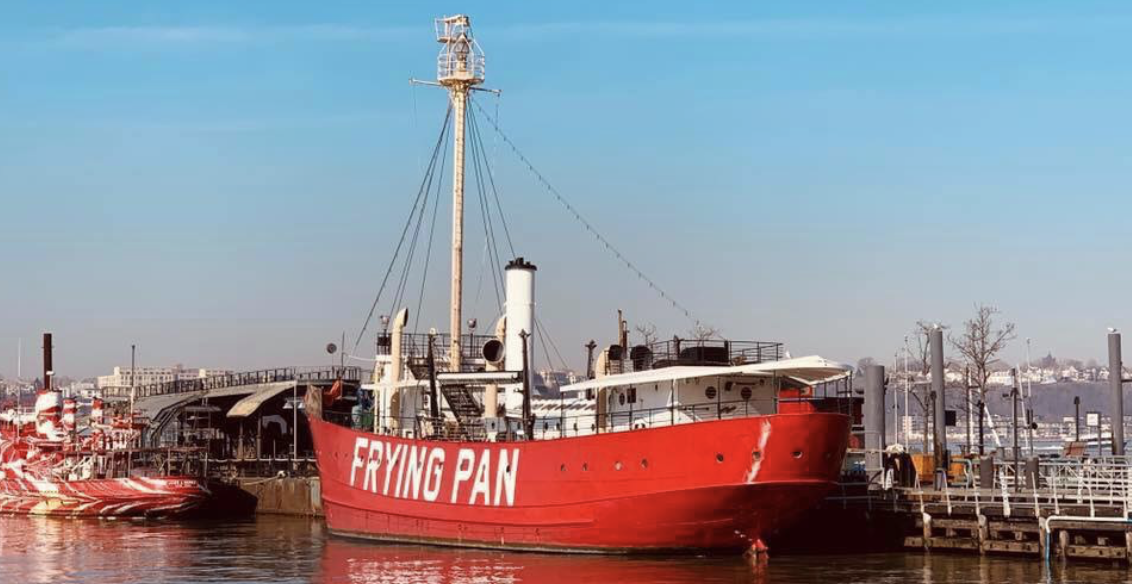

ARTICLES, EXCHANGES, AND INTERVIEWS 2000-2019
The Story of FENCE by Rebecca Wolff, July 2000
The Resistible Rise of Fence Enterprises by Steve Evans, January 2001
Responses to “The Resistible Rise of Fence Enterprises” 2001-
Rebecca Wolff, Editor of Fence Books, interview with Jendi Reiter, Winter 2006
Q&A: Rebecca Wolff's Fence Turns Ten by Kevin Larimer, May 1, 2008
Personal in Public by Rebecca Wolff, June 2010
What does FENCE mean? by Johannes Goransson, August 24, 2011
Heads Will Roll [or: I Did It My Way] by Rebecca Wolff, December 6, 2012
'Fence' Has Been Reconfiguring the Literary Landscape for 15 Years by Blake Butler, May 30 2013
Rebecca Wolff Gets Personal With the Program in New Issue of Fence, December 2013
Mothers in Publishing: Changing the Literary Landscape, May 7, 2016
Fence Digital Book Design by James Bellflower, November 6, 2017
On putting thoughts into action: From a conversation with Annie Bielski, December 17, 2019
From Rae Armantrout’s poem "Whatever" Winter/Spring 2007-2008:
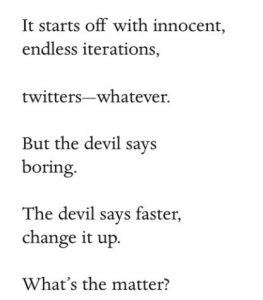
Below, hazy, very low quality video filmed by FENCE Editorial Co-Director Jason Zuzga (in his then capacity as Knopf website editor) of moments from a 2001 FENCE benefit performance of Anne Carson's Decreation.
